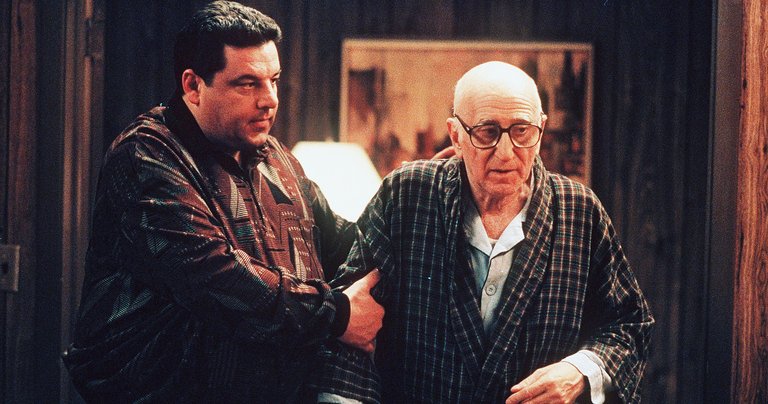Television Review: Second Opinion (The Sopranos, S3X07, 2001)

Second Opinion (S03E07)
Airdate: April 8th 2001
Written by: Lawrence Konner
Directed by: Tim Van Patten
Running Time: 59 minutes
Following the emotional intensity and brutal realism of the preceding episode, University, which depicted the tragic downward spiral of Tracee, a young stripper, Second Opinion initially appears uneventful and unremarkable. At first glance, it might even be dismissed as mere “filler,” a transitional piece designed to bridge more dramatic moments in the series. However, this assessment would be a disservice to the episode’s nuanced storytelling and its subtle yet significant contributions to the overarching narrative. Despite its quieter tone, Second Opinion delivers high-quality content, blending drama, social commentary, and black humour, while intelligently laying the groundwork for future plot developments.
The episode’s title, Second Opinion, refers to its central storyline involving Uncle Junior’s health crisis. After undergoing surgery for a tumour, Junior is initially informed by his surgeon, Dr. John Kennedy (played by Sam McMurray), that the procedure was successful. However, this optimism is short-lived, as Dr. Kennedy later reveals that additional cancerous cells were found, necessitating another surgery. Junior, ever the pragmatist, seems resigned to this fate, but Tony, displaying genuine concern for his uncle, seeks a second opinion from another doctor. This new physician recommends chemotherapy instead of further surgery, a treatment plan that Junior reluctantly agrees to. The chemotherapy’s debilitating side effects take a toll on Junior, exacerbating his vulnerability and frustration. Meanwhile, Dr. Kennedy becomes increasingly unresponsive to Junior’s calls, a neglect that Tony and Furio address with their own brand of “friendly persuasion” during a chance encounter at a golf course. This confrontation leads to Dr. Kennedy suddenly becoming more attentive to his patient’s needs, highlighting the pervasive influence of Tony’s world even in seemingly unrelated spheres like healthcare.
While Junior’s health struggles form the backbone of the episode, Christopher Moltisanti’s subplot serves as a stark reminder of the drawbacks of being a “made man” in the Mafia hierarchy. Christopher, now fully entrenched in the family business, finds himself subjected to constant harassment and humiliation by his immediate superior, Paulie. In one particularly degrading scene, Paulie forces Christopher to strip in front of others to prove he isn’t wearing a wire. Later, during an unannounced visit to Christopher’s home, Paulie crosses another line by sniffing Adriana’s underwear, a violation that underscores the toxic power dynamics within the organisation.
Carmela Soprano’s storyline, meanwhile, takes a more introspective turn. With A.J. away on a school trip, Carmela finds herself alone in the house, a rare moment of solitude that prompts her to reflect on her life and marriage. On the surface, she remains the dutiful wife, using her position to advocate for Angie, the widow of the late Pussy Bonpensiero, by persuading Tony to provide financial support. However, Tony sees through Angie’s motives, accusing her of being deceptive. Carmela’s efforts to secure Meadow’s standing at Columbia University further illustrate her desire to maintain a façade of normalcy and respectability. Her lunch with Dean Ross (played by Frank Wood), a smooth-talking university official, reveals the transactional nature of elite education. Ross’s demand for a $50,000 donation initially seems excessive, but Tony ultimately agrees, perhaps subconsciously aware that his marriage is teetering on the edge.
Indeed, the fragility of Tony and Carmela’s marriage becomes a focal point in the episode. When Tony fails to attend a joint therapy session with Dr. Melfi, Carmela is advised to seek individual counselling with Dr. Melfi’s former mentor, Dr. Krakower (played by Sully Boyar). Unlike Dr. Melfi, who often treads carefully around Tony’s criminal lifestyle, Dr. Krakower is blunt and uncompromising. He condemns Tony’s actions and, more pointedly, criticises Carmela for enabling his behaviour. In no uncertain terms, he advises her to divorce Tony and insists that the only morally correct course of action is for Tony to face justice in prison. While Carmela does not immediately act on this advice, the session leaves a profound impact, planting the seeds for future actions.
Second Opinion is an intriguing episode that masterfully blends drama, social commentary, and black humour. It opens with a surreal dream sequence in which Junior, under anaesthesia, fantasises about betraying Tony to the FBI, curing his cancer, and marrying Angie Dickinson. This humorous yet poignant moment, coupled with Junior’s reverence for his surgeon’s presidential namesake, underscores his outdated mindset, firmly rooted in the early 1960s. Tony, who now views Junior as a pitiable old man rather than a rival, steps in to help him, showcasing a rare moment of familial loyalty.
The episode’s central themes revolve around corruption and the abuse of power. Paulie’s mistreatment of Christopher, Dr. Kennedy’s neglect of Junior, and Dean Ross’s exploitation of wealthy parents all illustrate how authority can be wielded irresponsibly. Even within the ostensibly respectable institutions of medicine and education, self-interest often takes precedence over ethical conduct.
Amid this moral quagmire, Dr. Krakower emerges as a rare voice of integrity. Played by Sully Boyar, a character actor best known for his role of bank manager in Dog Day Afternoon, Dr. Krakower serves as the episode’s moral anchor. His unflinching condemnation of Tony’s lifestyle and his blunt advice to Carmela provide a stark contrast to the moral compromises that define much of the series. Although Dr. Krakower appears only in this episode, his impact is profound, setting in motion a plot strand that could have far-reaching consequences. Tragically, Boyar passed away shortly before the episode aired, making this his final performance.
Second Opinion may lack the visceral intensity of other episodes, but it is far from inconsequential. Through its exploration of power, morality, and personal responsibility, it enriches the series’ narrative tapestry while setting the stage for future developments.
RATING: 6/10 (++)
Blog in Croatian https://draxblog.com
Blog in English https://draxreview.wordpress.com/
InLeo blog https://inleo.io/@drax.leo
InLeo: https://inleo.io/signup?referral=drax.leo
Hiveonboard: https://hiveonboard.com?ref=drax
Rising Star game: https://www.risingstargame.com?referrer=drax
1Inch: https://1inch.exchange/#/r/0x83823d8CCB74F828148258BB4457642124b1328e
BTC donations: 1EWxiMiP6iiG9rger3NuUSd6HByaxQWafG
ETH donations: 0xB305F144323b99e6f8b1d66f5D7DE78B498C32A7
BCH donations: qpvxw0jax79lhmvlgcldkzpqanf03r9cjv8y6gtmk9
Posted Using INLEO